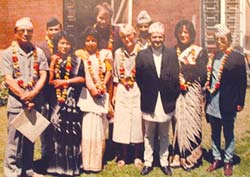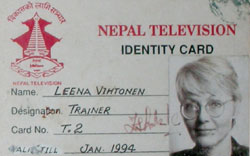 When Erkki and Leena Vihtonen first came to Nepal in 1985, Kathmandu was still unpolluted and one could bicycle around everywhere.
When Erkki and Leena Vihtonen first came to Nepal in 1985, Kathmandu was still unpolluted and one could bicycle around everywhere.
Nepal didn't have television so people weren't yet exposed to the global consumerist culture. Homes in Kathmandu could receive Indian tv channels through special antennas, but most just watched videos at home.
The Vihtonens were sent to Nepal by the Worldview International Foundation (WIF) to help start regular television transmissions in Nepal. When they came here in November 1985, they were told they had to get NTV on the air on King Birendra's birthday in December 1986.
But the royal astrologers decided 1986 was inauspicious so the tv project was brought forward by a year, which meant Erkki and Leena had just a month to do it. "It was a very tight deadline, but we decided to do it anyhow," says Leena, who is in Kathmandu with her husband for the 21st anniversary of their stint.
Their first training course started immediately, and Nepali producers and journalists went on air a month later on 29 December, 1985, the birthday of the late king. At that time there was no professional infrastructure available, all the video editing was done from one VHS deck to another.
"Despite the primitive equipment, what encouraged us most was the talent and motivation of our Nepali trainees," recalls Erkki, "without that the whole effort would have collapsed."
In fact, an evaluation team from the Asian Broadcasting Union advised the Vihtonens to abandon the training because television for Nepal was unrealistic. After the initial broadcasts, the operations moved to a new studio on the top floor of Singha Darbar in February 1986, and part of the operations still remain there.
The Vihtonens tried from the beginning to make NTV into a true public service broadcaster with credible and independent news and a mix of development information, education, and entertainment. But these were the years of the Panchayat, so news and current affairs soon became the propaganda tool of the government. Ironically, the restoration of democracy didn't change things much, because elected governments did the same thing.
"Technically, nothing prevented NTV from being the best television news in Asia," says Erkki, "but the journalists were always under pressure to do ministerial appearances." The Vihtonens' students couldn't really use their journalism training, as they were assigned news depending on what the government of the day felt it was important to highlight. Reporters were never encouraged to think, research, or show initiative.
 We asked Leena if, looking back now, she thinks their plans were optimistic or na?ve. "Optimstic, yes, in the sense that there really was a possibility to do it in a different way," she replied.
We asked Leena if, looking back now, she thinks their plans were optimistic or na?ve. "Optimstic, yes, in the sense that there really was a possibility to do it in a different way," she replied.
Despite the frustration, the husband and wife from Finland keep coming back to Nepal. They have good friends here among the 200 tv professionals and journalists they have trained. Among them are people who are now leaders in Nepali broadcasting: Prakash Jung Karki of NTV2, Kiran Chitrakar in NTV, Robin Sharma at Radio Nepal, Rama Singh NTV News, freelance documentary maker Dhruba Basnet, Laxman Upreti with the Japanese channel NHK, noted video editor Rabindra Pandey and many others .
"We were 15 of us and they really motivated us and excited us about the medium," recalls Robin Sharma, who is now deputy executive director of Radio Nepal, "Erkki and Leena said I had a great future in television but I landed up in radio instead."
The Vihtonens are also responsible for the familiarity many Nepalis have with the cult Finnish cartoon series, the Moomins. Initially, when the couple convinced Nepal Television to dub and run the show, many were sceptical that baloony cartoon characters from a northern European country would have relevance to Nepal, but the series has been a hit.
"It think the reason is that the Moomins are a close-knit but extended family: mother, father, children, relatives and many kinds of friends, and there are mountains in the neighbourhood," explains Leena. The family are green (in principle, not colour) and kind-there's no shooting anyone-and there is always a gripping plot.
Looking at the development in media in the last 21 years, what suggestions do the Vihtonens have for the new interim government in Nepal? "Politicians would understand that the public media prospers best under democratic control," says Erkki with conviction, "NTV and Radio Nepal should be under parliament, not under the government."
The need is the same as it was back in 1985, say the Finnish trainers: a multi-partisan parliamentary council should govern broadcasting, but never meddle in its day-to-day affairs.


